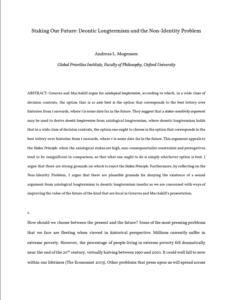Staking our future: deontic long-termism and the non-identity problem
Andreas Mogensen (Global Priorities Institute, Oxford University)
GPI Working Paper - No. 9-2019
Greaves and MacAskill argue for axiological longtermism, according to which, in a wide class of decision contexts, the option that is ex ante best is the option that corresponds to the best lottery over histories from t onwards, where t is some date far in the future. They suggest that a stakes-sensitivity argument may be used to derive deontic longtermism from axiological longtermism, where deontic longtermism holds that in a wide class of decision contexts, the option one ought to choose is the option that corresponds to the best lottery over histories from t onwards, where t is some date far in the future. This argument appeals to the Stakes Principle: when the axiological stakes are high, non-consequentialist constraints and prerogatives tend to be insignificant in comparison, so that what one ought to do is simply whichever option is best. I argue that there are strong grounds on which to reject the Stakes Principle. Furthermore, by reflecting on the Non-Identity Problem, I argue that there are plausible grounds for denying the existence of a sound argument from axiological longtermism to deontic longtermism insofar as we are concerned with ways of improving the value of the future of the kind that are focal in Greaves and MacAskill’s presentation.
Other papers
Are we living at the hinge of history? – William MacAskill (Global Priorities Institute, Oxford University)
In the final pages of On What Matters, Volume II, Derek Parfit comments: ‘We live during the hinge of history… If we act wisely in the next few centuries, humanity will survive its most dangerous and decisive period… What now matters most is that we avoid ending human history.’ This passage echoes Parfit’s comment, in Reasons and Persons, that ‘the next few centuries will be the most important in human history’. …
How to neglect the long term – Hayden Wilkinson (Global Priorities Institute, University of Oxford)
Consider longtermism: the view that, at least in some of the most important decisions facing agents today, which options are morally best is determined by which are best for the long-term future. Various critics have argued that longtermism is false—indeed, that it is obviously false, and that we can reject it on normative grounds without close consideration of certain descriptive facts. In effect, it is argued, longtermism would be false even if real-world agents had promising means…
A non-identity dilemma for person-affecting views – Elliott Thornley (Global Priorities Institute, University of Oxford)
Person-affecting views in population ethics state that (in cases where all else is equal) we’re permitted but not required to create people who would enjoy good lives. In this paper, I present an argument against every possible variety of person- affecting view. The argument takes the form of a dilemma. Narrow person-affecting views must embrace at least one of three implausible verdicts in a case that I call ‘Expanded Non- Identity.’ Wide person-affecting views run into trouble in a case that I call ‘Two-Shot Non-Identity.’ …

